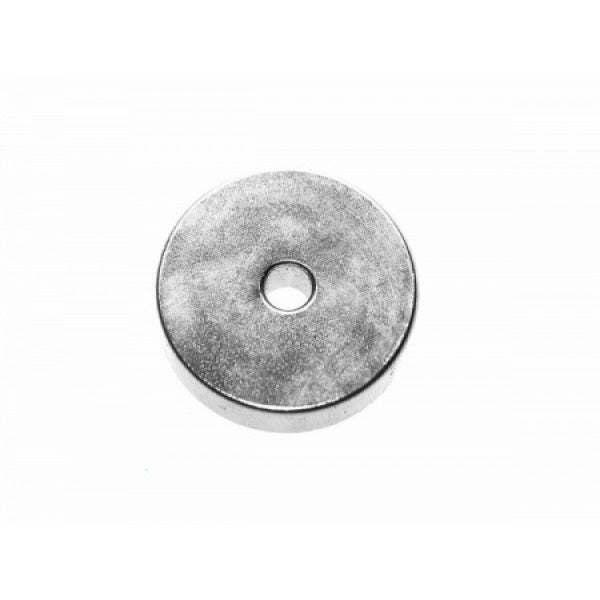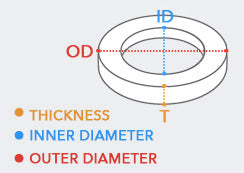Fast delivery, good products
I ordered a couple of magnets for my tank bag and they worked like a charm
Product code: 23015


 Earn 5 points for this product with AMF Magnetics Perks
Earn 5 points for this product with AMF Magnetics Perks
Prices are GST Incl.
Request a Quote for Bulk OrdersAustralia's Leading Supplier
Shipping Worldwide*
30 Day Returns
Same Day Dispatch*

This rare earth ring magnet has an outside diameter of 20mm, an inside diameter of 5mm and a thickness of 3mm. It has a pull force of 3.8kg. It is identified by the AMF magnet part number 23015.
Building high quality laboratory equipment including temperature and humidity control cabinets, plant growth chambers and commercial ovens and refrigerators is made simpler and safer with neodymium ring 20mmx5mmx3mm ring magnets. Supplying the medical, pharmaceutical, and agriculture industries the specialised laboratory equipment, like these ring magnets, must be accurate and durable.
Many companies offer to design and construct equipment to suit a specific laboratory purpose. The use of magnets, including ring magnets as a connective tissue or a versatile and well established method of hold, lock, release and re-hold allows for simplicity of design and use. Magnets, whose fixing and intuitive push and pull forces operate through attraction and repulsion provide opening and closures with very significant advantages over traditional fastening systems.
Penetrative fastening methods like screws, bolts and rivets breach the surface of the equipment, that is, break into the surface in order to perform their fastening function. Breaching the surface of laboratory equipment, glass, metal or plastic creates a void for the introduction of bacteria and waste accumulation (grime).
Magnets, fortunately, hold or lock, depending on the pull force of a particular magnet, through low impact yet very secure engagement, without creating a breach in the material or fabric of the equipment. In the controlled environment of a laboratory, managing every contamination risk is paramount. Magnetic properties of lock and release at a predetermined pull force, also allows for the equipment to be taken apart for regular cleaning. This property of magnetic fastening allows the equipment to be dissembled to be cleaned and sterilised, more often, more easily, more cheaply and more thoroughly.
In a controlled, sterile environment where research is undertaken often for the greater good of all human beings, magnets, including these modest ring magnets, are the unsung heroes in this important work.
Ring magnets of moderate pull force are often used in school projects and theatrical productions. Also found in modern cabinetry secret fixing applications in retail and kitchen and bathroom renovations.
No FAQ available

NB: Ranges are indicative for product category, please check individual products for specic values within that range.



The most common coating for Neodymium magnets is Nickel + Copper + Nickel (Ni + Cu + Ni). This coating offers the magnet relatively good protection from corrosion and passive applications. If the magnet will be exposed to moisture or liquid then consider the use of an organic coating such as Epoxy. A hard wearing coating, Epoxy is suited to applications where the magnet will come under some friction or knocking.

Magnets are readily available in Blocks, Discs, Cylinders & Rings. AMF Magnetics specializes in the supply of short-run prototype magnets including Arc Segments, various magnetic orientations etc. If you need a magnet size that we don't carry in stock, submit a Design-a-Magnet enquiry for a quote on your custom magnet design.

Neodymium magnets are offered in several different grades. The first section N30-54 has an operating temperature of up to 80 degrees. Most of our stock only goes up to N38. The second section, denoted with the "M" prefix after the grade has an operating temperature 100 degrees. After this the grades are "H", "SH", "UH" & "EH". In order for the magnet to withstand a higher operating temperature, during production more of the raw material PrNd is incorporated as these elements have a naturally occurring resistance to high temperatures.

This rare earth ring magnet has an outside diameter of 20mm, an inside diameter of 5mm and a thickness of 3mm. It has a pull force of 3.8kg. It is identified by the AMF magnet part number 23015.
Building high quality laboratory equipment including temperature and humidity control cabinets, plant growth chambers and commercial ovens and refrigerators is made simpler and safer with neodymium ring 20mmx5mmx3mm ring magnets. Supplying the medical, pharmaceutical, and agriculture industries the specialised laboratory equipment, like these ring magnets, must be accurate and durable.
Many companies offer to design and construct equipment to suit a specific laboratory purpose. The use of magnets, including ring magnets as a connective tissue or a versatile and well established method of hold, lock, release and re-hold allows for simplicity of design and use. Magnets, whose fixing and intuitive push and pull forces operate through attraction and repulsion provide opening and closures with very significant advantages over traditional fastening systems.
Penetrative fastening methods like screws, bolts and rivets breach the surface of the equipment, that is, break into the surface in order to perform their fastening function. Breaching the surface of laboratory equipment, glass, metal or plastic creates a void for the introduction of bacteria and waste accumulation (grime).
Magnets, fortunately, hold or lock, depending on the pull force of a particular magnet, through low impact yet very secure engagement, without creating a breach in the material or fabric of the equipment. In the controlled environment of a laboratory, managing every contamination risk is paramount. Magnetic properties of lock and release at a predetermined pull force, also allows for the equipment to be taken apart for regular cleaning. This property of magnetic fastening allows the equipment to be dissembled to be cleaned and sterilised, more often, more easily, more cheaply and more thoroughly.
In a controlled, sterile environment where research is undertaken often for the greater good of all human beings, magnets, including these modest ring magnets, are the unsung heroes in this important work.
Ring magnets of moderate pull force are often used in school projects and theatrical productions. Also found in modern cabinetry secret fixing applications in retail and kitchen and bathroom renovations.
No FAQ available

NB: Ranges are indicative for product category, please check individual products for specic values within that range.



The most common coating for Neodymium magnets is Nickel + Copper + Nickel (Ni + Cu + Ni). This coating offers the magnet relatively good protection from corrosion and passive applications. If the magnet will be exposed to moisture or liquid then consider the use of an organic coating such as Epoxy. A hard wearing coating, Epoxy is suited to applications where the magnet will come under some friction or knocking.

Magnets are readily available in Blocks, Discs, Cylinders & Rings. AMF Magnetics specializes in the supply of short-run prototype magnets including Arc Segments, various magnetic orientations etc. If you need a magnet size that we don't carry in stock, submit a Design-a-Magnet enquiry for a quote on your custom magnet design.

Neodymium magnets are offered in several different grades. The first section N30-54 has an operating temperature of up to 80 degrees. Most of our stock only goes up to N38. The second section, denoted with the "M" prefix after the grade has an operating temperature 100 degrees. After this the grades are "H", "SH", "UH" & "EH". In order for the magnet to withstand a higher operating temperature, during production more of the raw material PrNd is incorporated as these elements have a naturally occurring resistance to high temperatures.

The Pull Force listed for each magnet is based on lifting 10mm thick steel from a horizontal surface. Magnets on a vertical surface (of 10mm thick steel) are generally able to hold around only 30% of the pull force listed in the product description. This is due to the effects of gravity and the lack of friction between the surface and the shiny magnet. Read More